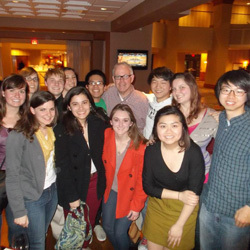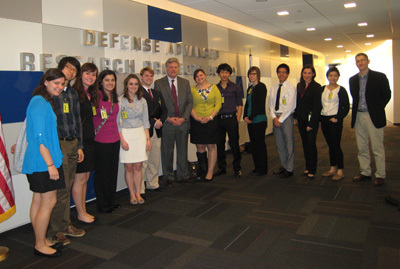

Over spring break, students and faculty participating in the Center for Social Concerns and College of Science seminar, Science Policy Ethics: Guiding Science Through the Regulation of Research and Funding, traveled to Washington, D.C. to meet with scientists, federal agencies, and policy makers working at the intersection of science and government. The seminar included 12 undergraduate and graduate students from across the College of Science and College of Engineering, with diverse career interests spanning basic and translational science, medicine, and public policy, including:
- Shannon Cawley, graduate student, global health
- Rachel Cotton, junior, biological sciences
- Nicole Fantozzi, freshman, environmental sciences and Spanish
- Jonathan Jou, sophomore, biological sciences and economics
- Enrique Lorenzo, freshman, mathematics and political science
- Katrina Magno, sophomore, physics with a concentration in astrophysics
- Monica McNerney, junior, chemical engineering
- Young Moon, junior, biological sciences
- Kristen Parkinson, sophomore, mechanical engineering
- Kristi Pellegrini, graduate student, civil and environmental engineering and earth sciences
- Mary Schreck, junior, biological sciences
- John Vernon, junior, science preprofessional studies and psychology
The seminar aimed to demystify the life cycle of science in Washington, encompassing funding allocation and appropriation by Congress, distribution of federal funds to scientists, the pathway from basic scientific discovery to translational research, and ultimately the introduction of new technology and policy to the general public. This is the first time that such a course has been offered, forging a new partnership between the College of Science and the Center for Social Concerns.
“This seminar provided a great opportunity for the students to discuss all the major ethical and policy issues associated with scientific research undertaken for or supported by the federal government. They had the opportunity to meet and network with individuals who are directly involved in science policy,” said Dominic Chaloner, assistant research professor in the College of Science.
The experience was beneficial for both the students and the people they met in Washington.
“It’s not every day that we get the chance to meet with students to talk about what we do,” said Emily Thakur, a Senior Program Management Officer for the FDA Drug Shortage Program. The same sentiment was echoed in several other meetings throughout the week.
“I enjoyed hearing from individuals with a background in science, but who are now working in policy; it was great to see this other career path that I could take”, said Katrina Magno, a sophomore physics major concentrated in astrophysics.
The week-long seminar included visits to the following individuals and agencies:
- Congressman Ralph Hall, chairman emeritus of the House Space Science and Technology Committee, and his chief of staff Janet Poppleton, discussed science policy drafting and decision-making.
- Dr. Jack Kaye, associate director for research at Earth Sciences Division at NASA Headquarters, explained NASA’s role in global climate monitoring.
- The group received a guided tour of the National Institutes of Health (NIH) Clinical Center.
- Captain Phil Coyne, a professor at the Uniformed Services University of the Health Sciences (USUHS) and a Notre Dame alumnus, led a discussion on government funding of clinical, translational, and operational research, with a particular focus on neglected tropical diseases.
- Rear Admiral Sandra Kweder, Deputy Director, and Dr. Anne Pariser, Associate Director for Rare Diseases, at the Center for Drug Evaluation and Research at the Food and Drug Administration (FDA), presented ethical concerns of drug development and clinical trials for rare and neglected diseases.
- The students attended a President’s Council of Advisors on Science and Technology (PCAST) meeting and heard discussions on recommendations for graduate education in chemistry, and progress made by a joint committee on standardizing techniques in forensic science.
- Dr. Steven Walker, a Notre Dame alumnus and Deputy Director of the Defense Advanced Research Projects Agency (DARPA), gave an overview of the types of science and technology projects at DARPA, describing the agency as one that thinks outside the box with its eye on innovating for the future, rather than on affecting incremental change.
Even though spring break has ended, a dialogue between Washington, D.C. and Notre Dame Science students by no means ends here.
The Science Policy Ethics Seminar was supported by the College of Science and the Center for Social Concerns. For more information, contact Rachel Cotton at rcotton1@nd.edu.